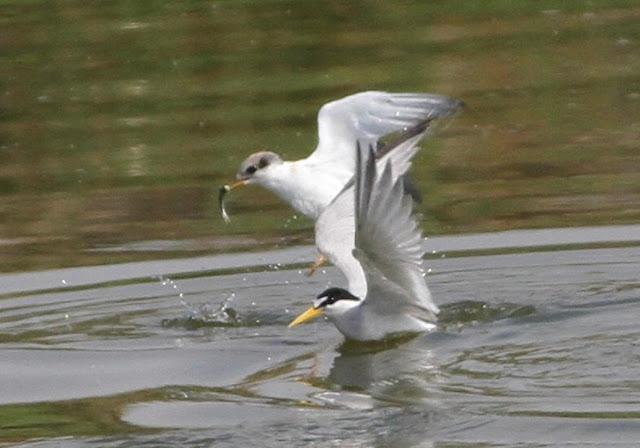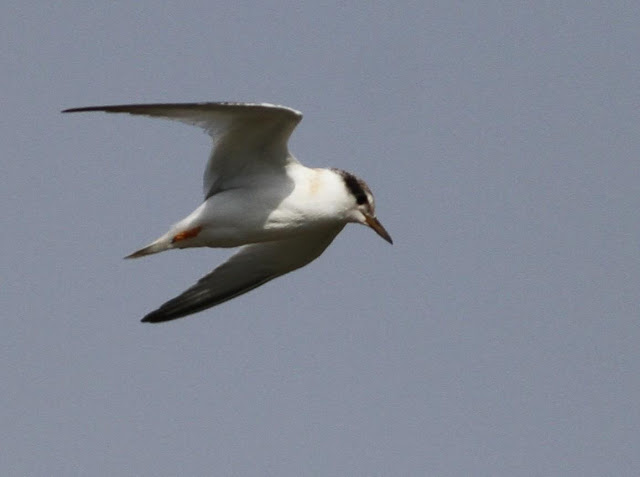There are not too many bird subjects this time of the year
but if you are patient and go there at low tide, you may see several Terns
hunting for breakfast at the tide channels of San Elijo Lagoon. Today, there was
another first for me... I got to observe a food transfer in the lagoon by
a California Least Tern to a fledgling!
The mornings have been hot and muggy and bird subjects few but today, it's low
tide with a nice ocean breeze and it is a joy just to be out searching the sky
for bird subjects to appear. My first subject is a Caspian Tern just starting
his dive.
Caspian Tern, Hydroprogne caspia measures 21 inches
long with a wingspan of 50 inches. They are our largest Tern. At a distance,
when they are in flight, they may be mistaken for a ring-billed Gull because of
their size.
Being the largest of the terns, they are also slower so it is possible to get a
few shots of them diving. Here is the tern is a downward arch of his dive.
Getting speed.
Beautiful form.
Slight adjustment of his strike zone with a shift of his tail feathers.
Touch down and coming back up.
Gulped his fish down and is up and working his beautiful long wings to gain
altitude.
Lots of water drops coming off his feathers.
The cool water must feel great for a morning dip.
And off he goes.
Circles overhead for a shot of his underside.
This female Mallard was hilarious, every fifteen minutes she would fly by
quacking. We could almost set our watches by it. After the fourth flyby, I
decided to go ahead and take a shot of this diva! LOL, I think she really
wanted her photo taken.
A Great Blue Heron lands on the other side of the tide channel.
GBH are always an exciting subject to shoot.
Love the beautiful huge wingspan.
What a treat, a California Least Tern has flown into the reserve
and is hunting for breakfast right in front of the lookout by the visitor
center.
These terns are so very difficult to photograph
because of their speed and the zigzagging way that they fly. They will turn on a
dime and dive so fast you can hardly see them and trying to get your camera to
follow is almost impossible!
California Least Tern, Sternula antillarum
browni measures 9 inches long with a wingspan of 20 inches.
California Least Terns are much smaller than all the other terns. They are also
on the endangered list.
This California Least Tern is in breeding plumage. Notice the white on the forehead and the two dark primary feathers and the yellow beak. Only the
breeding adult has these markings. Also notice the leg band on the right
leg.
All of a sudden the tern has caught a fish and a youngster has flown down to beg
for breakfast. The adult tern flies over with the fish to feed her fledgling.
These photos are taken quite far but it was my first sighting of a food exchange
by a tern and wanted to share them with you.
The exchange.
Adult makes sure the fledgling has a tight grip on the fish.
The youngster takes the fish and jumps out of the water. Mom keeps an eye out
for predators or anyone that might want to steal the fish.
Off he goes.
The adult pumps her wings for a straight up take off.
Up she goes.
Youngster has got a firm grip on the fish and gets ready to swallow. Adult escorts
for a distance to make sure there is no danger.
Another adult Least Tern flies by.
Hunting for breakfast.
Another California Least Tern fledgling has followed the adult over the tide channel near the lookout
deck. Notice his back has some faint barring.
Already showing great flying skills.
Adorable little fledgling.
And here's mom with breakfast!
She flies by with the fish dangling. Probably a signal
for the youngster to come and get it.
Flying up the tide channel.
Found the youngster and he is really begging for that fish.
The adult has her back to us so it is difficult to see the food transfer but
here is a little peak at the youngster grabbing for the fish.
Exchanging fish from the adult to the fledgling.
Got it! The youngster looks absolutely delighted to
have his breakfast. Turns and gets ready to fly off as the adult leaves her
wings spread like a privacy curtain.
Ready to depart.
Off goes the youngster and mom gets ready to fly too.
Beautiful flying by the youngster. He is learning where to catch the meals by
following the parent to the hunting grounds. Soon he will be getting his own
food.
Notice there is a leg band on the adult.
As soon as the Terns disappear out of the lagoon, an Osprey appears with his
catch of the day.
It looks like a mullet but not sure. He is quite far
and is heading for his favorite telephone pole on Manchester Drive near the
bluffs.
I believe this to be our resident male Osprey. He is usually around somewhere
in the area.
A proud adult Snowy Egret struts by with a "wonky" feather sticking out the
side.
With so many egrets hunting in our lagoon, it is nice to have a temporary marker
to ID the individual. Here he slams the water with such force it creates a water
form captured by my camera's stop motion.
This particular duckling is the one we call "The runt" she has been the smallest
of the hatchlings that were spotted hanging around the tide channel but has
become the most aggressive hunter. She is grabbing the baby crabs like popcorn
and devouring anything and everything she can find. What a survivor. She is
going to be just fine.
Unless she runs into this guy, the California Diamondback Rattlesnake. He was just in front of the southeast side of the trails called the "duck pond"
slithering across the trail as I was walking by. California has lots of
rattlesnakes and everyone must be really careful of these poisonous snakes even if you are in your
backyard. Due to the drought, more and more rattlesnakes are spotted in
backyards looking for water.
The Rattles!
This female Common Yellowthroat in a nearby bush is keeping an eye on
everything.
























































Jo, more amazing pictures and commentary. I just have to say "thank you", your posts are the highlight of my day! Hope to run into you sometime!
ReplyDeleteThank you Nancy for your kind words. I enjoy sharing my observations of these beautiful birds with readers like you.
DeleteSee you out birding!